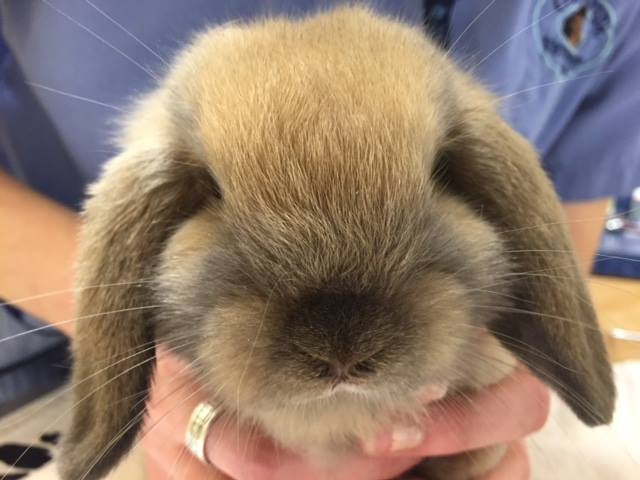 Veterinary Well-Check
Veterinary Well-Check
- It is important to have a complete physical exam by your veterinarian on your new pet and then annually.
- Your veterinarian will examine the eyes, ears, teeth, heart, and lungs and will palpate the abdomen, and examine the genitalia.
- Spaying and neutering are essential to a rabbit’s health. At around 4-6 months of age, male rabbits should be neutered and female rabbits should be spayed. Neutering helps curb aggressive behavior in males and can deter territorial problems like urine spraying.
Laboratory
- At 3 or 4 years of age, annual blood work is recommended to look for early signs of disease such as kidney or liver disease and high calcium values which predispose rabbits to bladder problems.
Housing
- Minimum of 2x3 feet for small breeds and 3x4 feet for large breeds. The largest cage you can afford and have room for is most appropriate.
- Cage bottom should be solid Plexi-glass, hard plastic, or stainless steel. If the cage has a wire mesh bottom, cover half of it with a solid surface to prevent pressure sores on the feet.
- Housing rabbits inside your home will prevent heat stroke, maggot infestations, and other problems associated with being housed in outdoor hutches.
- Multiple house rabbits should be supervised when together to prevent injuries from fighting.
Playtime
- Rabbits should be allowed supervised time out of the cage daily for exercise and to interact with family members.
- Make sure to "rabbit-proof" the house by limiting access to wires and other household items.
- Safe chew items for rabbits include cardboard, baskets, and untreated wood.
Litterbox Training
- A litter box should be offered at all times and only paper pulp products paper pulp product such as Carefresh, Yesterday’s News, or other paper products like newspaper and computer paper. Clay or clumping cat litter and wood shavings can cause eye, skin, and respiratory problems.
- Encourage the rabbit to use its litter box by putting a few fecal pellets in it and then placing the box in the rabbit’s favorite place to eliminate.
Diet and Nutritional Supplements
- Timothy hay should compose the majority of the diet and a rabbit should have hay available at all times.
- In most cases, alfalfa hay contains too much calcium for rabbits and should be avoided.
- Commercial pellets that are made from timothy hay and that do not include seeds can be used as a supplement.
- Products like Bunny Basic "T" by Oxbow Hay www.oxbowhay.com are recommended.
- Water should be available at all times in either a bowl or bottle. It is important to regularly clean these items to prevent bacterial growth.
- 1-3 cups of leafy greens can also be offered daily.
- Recommended Greens:
- red and green leaf lettuce
- escarole
- watercress
- clover
- Swiss chard
- bok choy
- endive
- romaine lettuce
Greens to Avoid: dandelion, collard greens, turnip greens/tops, mustard greens, kale, broccoli
Hairball Prevention
- Give 1-3cc’s of cat hairball preventative 1-2 times weekly.
- Daily brushing will also help prevent mats and excess fur, however,
- A high-fiber diet that includes timothy hay is the most important part of hairball prevention.
Cecetrophs
- Cecetrophs, or night feces, are soft, mucus-covered feces that rabbits consume directly from the anus.
- Cecetrophs provide essential proteins, vitamins, and minerals and replenish a rabbit’s normal bacterial flora.
- Overweight or arthritic rabbits often cannot reach their rectum and may develop diarrhea or matting of the cecetrophs to their hindquarters.
Rabbit Urine
- Normal rabbit urine contains calcium-based sediment which can cause the urine color to vary from white to light brown.
- A rabbit under certain physiological conditions (such as stress) may produce urine that is orange or red-tinged which may look like blood.
- A urinalysis can determine if the urine is normal or contains blood.
Common Medical Problems
- Gastrointestinal stasis
- Overgrown molar or incisor teeth
- Heat stress/stroke
- Mites
- Respiratory infections
- Uterine and mammary cancers are common in unspayed females.
